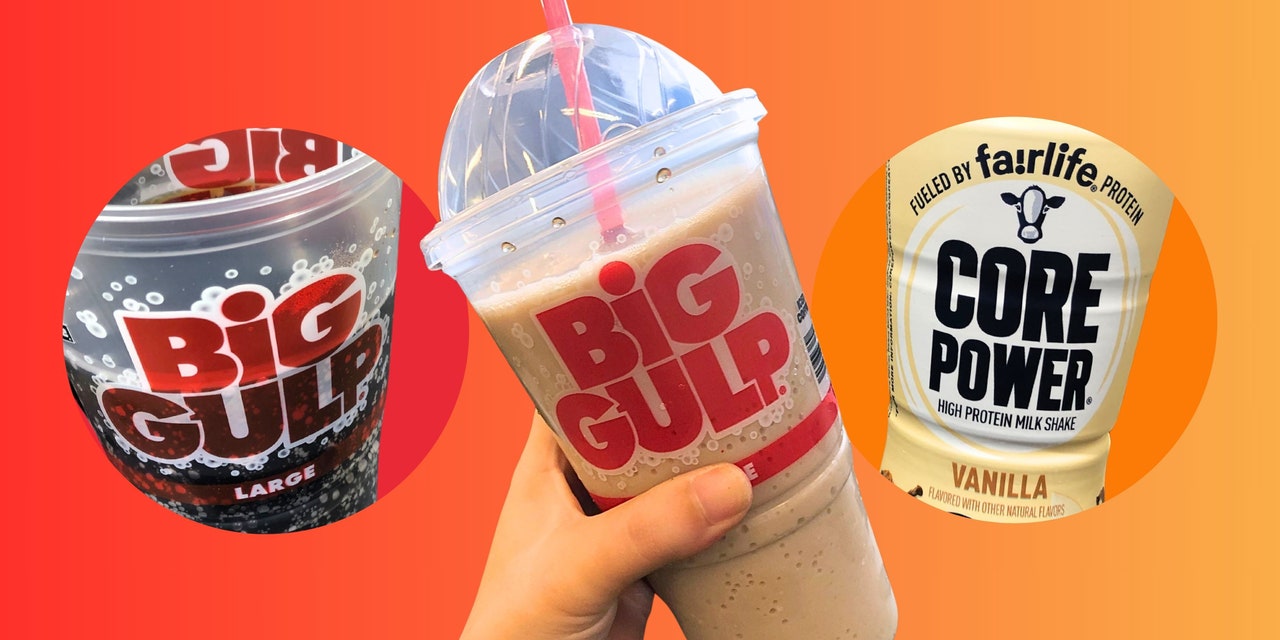
I don’t know about you, but I definitely did not have protein Diet Coke on my 2024 bingo card. Yes, really: People in Utah have apparently made this a thing, and it’s been popping throughout TikTok as more and more folks give it a shot too. In fact, the video that reportedly inspired the fad has amassed a whopping 2.3 million views in three days.
To be clear, protein Diet Coke isn’t an actual, official product sold by the Coca-Cola Company, but rather a mashup improvised by macro-focused soda fans. To make one, all you need to do is pour a vanilla-flavored protein shake (Core Power, per the video) into a cup of fountain soda and slosh the contents around a bit. The intended purpose? Making your favorite drink that much more protein-dense.
I had two questions come to mind: One, does the blend actually taste good? And two, are there any nutritional benefits (or drawbacks) associated with mixing these two ingredients? Based on a quick skim of the comments section, lots of folks seemed similarly concerned about the potential GI impact. This comment alone has 16.6k likes: “My digestive system would never recover.”
Even though my colleagues were skeptical, I figured it was worth a try. I purchased a Big Gulp at a nearby 7-Eleven and waited until I was back at my office to add the Core Power (partly because I figured it would be easier to mix the combo at my desk, but also because I didn’t want to face the judgment of the other 7-Eleven patrons). Full nearly to the brim, my drink resembled a root beer float: a bubbly, pale brown liquid. And much to the surprise of my colleagues (and myself), it—shocker—actually tasted like one too: fizzy but creamy, with a distinct hint of vanilla. Overall, pretty good; I’d say my expectations were exceeded.
With the taste question out of the way, it was time to check in with the experts for the nutritional rundown. Is this trend actually harmless? Or could the mixture of carbonated soda and dairy actually hurt your stomach, especially if you’re drinking up after a workout, when many folks reach for protein shakes? (And even if it is harmless, what exactly is the point?)
“I could see some pros,” Jessica Isaacs, RD, CSSD, a sports dietitian, tells SELF. While the soda itself doesn’t have any real nutritional benefits, the addition of the shake will obviously provide protein (26 grams, to be exact), not to mention some carbs, electrolytes, and calcium—all of which are helpful not only after a workout, but also just in general. “You take something like a Diet Coke that doesn’t really have any nutrition, and you’re increasing the nutrition of it, essentially,” Isaacs says.
For that reason, there’s no advantage to drinking a protein Diet Coke over the Core Power shake by itself, according to Isaacs. That said, the blend could be a solid option for people who don’t like the taste of protein shakes on their own or who want to make their Diet Cokes a tad more nutritious. If you struggle to take in enough protein throughout the day and this appeals to you, “I could see that being beneficial,” Isaacs says. However, she notes that the combination of dairy, caffeine, and carbonation could cause or exacerbate bloating and gas in those who have sensitive stomachs. (While Core Power is made with milk, it’s also lactose-free due to its ultra-filtered production, so it shouldn’t cause an issue for people who have trouble with dairy. However, other milk-based protein shakes might not be as well tolerated.)
Source: bing.com















:quality(70)/cloudfront-eu-central-1.images.arcpublishing.com/thenational/YN5MYAXRFSAFADNFB4HQSGQSSM.jpg?w=80&resize=80,60&ssl=1)





